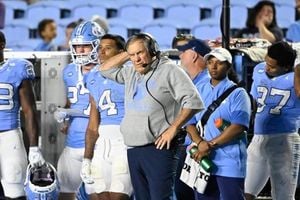In a story that’s gripped both local residents and a global online audience, a self-styled “African tribe” calling themselves the Kingdom of Kubala has been ordered to vacate privately-owned woodland near Jedburgh in the Scottish Borders. The group, comprising Ghanaian Kofi Offeh (36), Zimbabwean Jean Gasho (43), and American Kaura Taylor (21), had been camping in the area since the spring, claiming they were reclaiming land allegedly stolen from their ancestors four centuries ago. Their dramatic eviction, ordered on September 12, 2025, by Sheriff Peter Paterson at Jedburgh Sheriff Court, has sparked debate about land rights, historical memory, and the limits of protest in modern Scotland.
According to BBC and other news outlets, the trio—who refer to themselves as King Atehene, Queen Nandi, and handmaiden Asnat—first arrived in Jedburgh in May. They initially set up camp on a hillside above the town, only to be evicted by the Scottish Borders Council in July. Undeterred, they relocated about a mile away to woodland beside an industrial estate, where they continued their protest, much to the consternation of local authorities and the private landowners, David and Mary Palmer.
The group’s claim is rooted in their belief that their ancestors were expelled from the Highlands 400 years ago after Queen Elizabeth I’s 1596 order to remove the so-called “black Jacobites.” However, as reported by The Scotsman, historians note there is no evidence of mass deportations of Africans from Scotland, nor any historical record of a Kubala tribe in the region. While Queen Elizabeth I did issue proclamations in 1596 and 1601 regarding the deportation of Africans, these only applied in England, as Scotland was under a separate crown at the time.
Despite the lack of historical documentation, the Kingdom of Kubala’s stand has drawn significant attention online. The group boasts more than 100,000 followers on TikTok and Facebook, sharing videos of their daily life, singing, and dancing—even as eviction loomed. Their story has been picked up by media outlets worldwide, fueling a mix of support, skepticism, and outright criticism from the public. Some locals have left offerings of Irn-Bru and shortbread at their camp, while others have dismissed them as “delusional.”
The legal proceedings reached a head after the group ignored a previous eviction notice instructing them to leave by 5pm on Monday, September 8, 2025. The landowners, represented in court by lawyer Conner McConnell, sought the removal of the unauthorized occupiers from the woods known as Darnic Parklands. Sheriff Paterson’s ruling was unequivocal: “I am happy to grant decree forcing the eviction from the property,” he stated, awarding costs against the group to cover the sheriff officers’ expenses. The order called for “immediate extraction” from the land and interdicted the group from returning to the property or other land owned by the Palmers.
None of the group’s members were present at the six-minute court hearing, nor did they have legal representation. News of the ruling was relayed to them at their camp by journalists. Kofi Offeh, undeterred, told reporters, “The creator of the heavens and the Earth is the one with us. And we are not afraid of whatever the court—the so-called court—has granted.” He added, “If we must go, the creator will find us another place to go.” Asked about the possibility of jail, Offeh was defiant: “We are not scared of jail.” Jean Gasho echoed this sentiment, saying, “We’ve already been to jail for loving our children, do you think chains frighten us?”
The group’s actions have divided opinion in Jedburgh and beyond. Jedburgh councillor Scott Hamilton, deputy leader of the Scottish Borders Council, was clear in his assessment: “They have rebuffed every opportunity to engage with us. We can help them, but we won’t sit back and let them break the law.” Hamilton added that the landowner had been left with “no option” but to seek an eviction order after the group ignored multiple ultimatums. “This is disappointing but I can’t say it isn’t surprising given the group’s previous behaviour,” he said, urging locals not to engage with the group while the eviction process played out. The council pledged to support the landowners through the next steps and maintain additional safety measures until the situation is resolved.
The Kingdom of Kubala, meanwhile, has maintained a message of spiritual resilience. Offeh described their actions as prophecy rather than fantasy: “It is not a fantasy, it is a prophecy. We walk through prophecy and we live it as it comes.” Even as court officers prepared to enforce the eviction, the group continued to sing and chant in the woodland, sharing their experiences on social media for their global audience.
The group’s unconventional protest has raised questions about the intersection of history, identity, and property law in Scotland. While their claims of ancestral rights have not been substantiated by historical records, the story has resonated with many who see echoes of broader struggles over land and belonging. The case has also highlighted the power of social media in amplifying fringe movements and the challenges faced by local authorities in responding to such highly visible, if legally tenuous, protests.
For the landowners, David and Mary Palmer, the ordeal has been both disruptive and costly. Their lawyer, Conner McConnell, successfully argued for the removal of the group and an interdiction to prevent further occupation. The sheriff’s order also awarded expenses against the group to cover the legal and enforcement costs, though Offeh dismissed the financial penalty, saying, “We have no money. We do not use any currency, they can take it from our donations.”
As the eviction order takes effect, the future of the Kingdom of Kubala remains uncertain. The trio has shown little sign of abandoning their mission, insisting that if forced to leave, they will rely on divine guidance to find a new place to continue their quest. Their story, a blend of personal conviction, contested history, and modern protest, has left a mark on Jedburgh and sparked conversations far beyond the Scottish Borders.
Whether the Kingdom of Kubala’s stand will inspire further movements or fade into local lore remains to be seen. For now, their defiance—and the community’s response—offers a window into the complexities of land, law, and identity in 21st-century Scotland.






